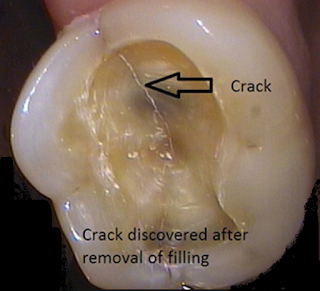Cracked Teeth
Below are some answers to common questions patient's have about cracked teeth:
- Why Do Teeth Crack?
- Will My Grinding Habit Make It Worse?
- Why Does It Hurt To Bite On It?
- Why Is It Sensitive to Hot and Cold?
- What Will Happen If I Just Do Nothing?
- What's The Usual Treatment for A Cracked Tooth?
- Is It Possible That The Nerve Is Already Dead?
- Is It Safe to Leave A Tooth With a Dead Nerve?
- If The Nerve is Dead, Do I still Need a Crown?
- Doesn't The Nerve Always Recover?
Why Do Teeth Crack?
Cracked tooth syndrome is a very common problem usually affecting teeth that have large amalgam (silver) fillings. Large fillings weaken the remaining tooth structure. Like all materials, teeth are subject to forces of stress fatigue.
Will My Grinding Habit Make It Worse?
Yes. Almost everyone, at some point in their life, grinds their teeth. Grinding can increase the stress and strain on a tooth by 200 to 300%, especially if you've worn down your canines and lost the protective 'lift off' effect they give in sideways movements. You may also have susceptible tooth anatomy or worn-down fillings, where the valleys on top of the teeth are deep. When these factors combine with sideways splitting forces generated while chewing fractures can result. Even unfilled teeth , if subject to enough force, can crack.
Why Does It Hurt To Bite On It?
As the tooth flexes (even in microscopic amounts), its nerve is stimulated. There are tiny, fluid-filled tubes (tubules) situated in the dentin (the inner layer of the tooth between the pulp and enamel). These tubules run down to the nerve and as the tooth flexes, the crack opens and closes, causing fluid to flow in and out of these tubules and put pressure on the sensitive nerve.
Why Is It Sensitive to Hot and Cold?
The nerve is aggravated/ inflamed by the crack and by the bacteria being pumped into it through the dentinal tubules. The pulp becomes inflamed because of the toxins in the bacteria. A Classic symptom of nerve inflammation is temperature sensitivity to hot and cold.
What Will Happen If I Just Do Nothing?
The crack will continue to propagate. Sometimes the crack goes off to one side of the tooth and a fragment of the tooth breaks off. The crack can also go deep into the roots and at times right into the nerve. Teeth can sometimes go for months in a stable, yet inflamed condition. Sometimes they may seem to get better, only to suddenly get worse. It's difficult to predict the course of the untreated tooth, but usually it follows a slow downhill course as the crack deepens. It's not a good idea to leave the fracture; small cracks can be treated effectively, but if they are left to enlarge, they can lead to root canals and possibly tooth loss. The nerve can be attacked by bacteria, leading to extreme sensitivity to hot and cold temperatures. A persistent ache or throbbing is often also noted.
What's The Usual Treatment for A Cracked Tooth?
Unless the crack is immobilized, the tooth is very likely to deteriorate. Although, various methods have been employed in an attempt to hold the crack together, chewing forces are extremely powerful, and these 'patch' solutions are often unpredictable and ineffective. The only permanent solution is to bind the whole tooth together with a crown. With full coverage, chewing forces will move the tooth as a whole rather than gradually splitting it apart.
Is It Possible That The Nerve Is Already Dead?
Yes. Cracks in teeth can develop very slowly, allowing a gradual ingress of bacteria into the nerve. As a result, the nerve can die in a manner that is less noticeable than usual. Nerves can become mildly sensitive to hot and cold without any noticeable symptoms or pain. Many patients have teeth which, unknown to them, have dead nerves. Sometimes there are even dormant abscesses on these teeth.
Is It Safe to Leave A Tooth With a Dead Nerve?
Sometimes you can get away with it for awhile, but unfortunately, these teeth are like ticking time bombs. The low grade infection that is usually in them can suddenly flare up and cause pain and swelling. This usually happens when your immune system is down. It is best to treat it as soon as possible to minimize the amount of bone destruction that occurs at the end of the root, where the infection comes out of the tooth and into the bone.
If The Nerve is Dead, Do I still Need a Crown?
Yes. You need a crown to stop the existing crack from spreading down the root of the tooth or getting worse. Crowns are needed following a root canal even more so than teeth with living nerves since root canal treated teeth are more brittle. Regardless of how a nerve dies, crack or no crack, it is standard practice to put a crown on a back tooth that has had a root canal because of this increased brittleness.
Doesn't The Nerve Always Recover?
No. Despite ideal treatment, about 10% of cracked teeth have nerves that eventually end up becoming necrotic and requiring root canals or an extraction. The tooth can still move slightly within the bone; this slight movement can additionally flex and crack the tooth rom below despite the crown protecting it from above. Sometimes the existing bacterial damage is so great that the nerve goes on to die regardless of the treatment performed. Early treatment is therefore recommended to minimize the size of the crack and the extent of the bacterial invasion.
